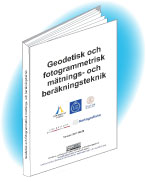Contents of this page may be automatically translated, we take no responsibility for the accuracy of the translation. Feel free to contact our customer support centre if you have any questions.

Here you will find various information and reading tips related to the HMK area, including HMK's technical reports with feasibility studies and in-depth studies.
HMKs technical reports (HMK-TR)
Here are all the reports in the HMK-TR series as well as other reports relevant to HMK.
The reports are in pdf format and opens in a new window.
Other reports and publications
Link to Surveying Reports (formerly called" Geodesy and Geographic Information Systems)
Link to other reports, strategy documents, etc. in the field of geodesy.
Course compendium Geodetic and photogrammetric measurement and calculation technology
"Geodetic and photogrammetric measurement and calculation technology" is a Swedish-language compendium produced in collaboration between Lantmäteriet (LM), the Royal Institute of Technology (KTH), Lund University (LU) and University of Gävle (HiG).

The compendium is intended for basic courses in geodetic and photogrammetric measurement technology (community measurement) and is included in the revision of HMK. Among other things, it will help to fill the need for technical descriptions in Nya HMK.
The compendium was produced through funding from the authors' employers, and through a financial contribution from Kartografiska Sällskapet (new window)
At the end of each chapter there are Reading Tips and Thanks - where the background to each chapter appears. Some chapters are completely newly written while others are compilations/adjustments of others' texts. Furthermore, there are references, indexes and abbreviations at the end of the compendium.
Chapters 1–11 were thoroughly revised in 2021 by Jonas Ågren, Lars Harrie and Milan Horemuz. Only minor changes were then made for chapters 12–15.
The compendium is protected by license
The compendium is protected by the "creative commons by-nc-nd" license. This means that it is free to distribute the compendium, but only in non-commercial contexts. Furthermore, the work may not be processed and the person using the work must state the author; the author in this case is ' Lantmäteriet m.fl.'. It is allowed to copy the compendium and sell it for cost price (= printing cost plus any shipping cost). More information about licensing issues can be found at: http://www.creativecommons.se (new window).
Download
Download the entire compendium: Geodetic and photogrammetric measurement and calculation technology, version 2021-10-14 (in Swedish, pdf 13 Mb, new window)
Download of separate part: Formula collection, version 2021-10-04 (in Swedish, pdf, new window)
| Chapter | Manager |
|---|---|
|
1 - Introduction |
Lars Harrie (Lunds universitet) |
|
2 – Earth models |
Lars Harrie (Lunds universitet) och Jonas Ågren (Högskolan i Gävle/Lantmäteriet)
|
|
5 – Measuring instruments |
Bengt Andersson (Lantmäteriet) |
|
6 – Terrestrial measurement methods |
Clas-Göran Persson (Lantmäteriet)
|
|
10 – GNSS |
Milan Horemuz (Kungliga Tekniska Högskolan) |
|
12 – Photogrammetry and aerial photographs |
Anders Boberg (Tyréns)
|
|
15 – Laser Scanning |
Perola Olsson (Lunds universitet), Helen Rost (I-CONIC Vision) and Yuriy Reschetiuk (Sweco Sverige AB) |
GUM, to express measurement uncertainty
GUM, Guide to the Expression of Uncertainty, is a world standard for expressing measurement uncertainty.
This standard was gradually introduced in Swedish measurement technology during the 2010s, including in connection with the new publication of HMK.
GUM is presented below in the form of an article, an accompanying presentation slide show and a number of examples and in-depth studies. The material is intended to be used for information about GUM and in the education in measurement technology at colleges, universities, etc.
- Article - GUM, a guide to expressing measurement uncertainty (in Swedish, pdf, new window)
- Slideshow (in Swedish, ppt, new window)
- Some Common Distributions (in Swedish, pdf, new window)
- Total measurement uncertainty and quantitative methods (in Swedish, pdf, new window)
- Example, Type A determination (in Swedish, pdf, new window)
- Example, Type B determination (in Swedish, pdf, new window)
- Correlated measurements (in Swedish, pdf, new window)
Two English-language descriptions are also available: an article and a slide show:
- Artikel - GUM, Guide to the Expression of Uncertainty in Measurement (pdf, new window)
- Slideshow (ppt, new window)
(lecture by CG Persson, Q-KEN, Riga, 25 October 2011).
Lantmäteriet, The Royal Institute of Technology, KTH, Lund University and the University of Gävle started a joint project in 2010 to introduce GUM in measurement technology in Sweden.
References
See also the following references:
- Popular science GUM-info from the Swedish Technical Research Institute (in Swedish, pdf, new window)
- GUM-based FIG standard for GNSS measurement uncertainty, pages 19-30 (pdf 3 Mb, new window)
Measurement technical skill
§ 13 of the Survey Proclamation prescribed "authority to independently carry out surveying and mapping". In connection with the measurement announcement being discontinued in 2010 (SFS 2010:167 (in Swedish, pdf, new window)) new recommendations were drawn up in collaboration between Lantmäteriet, the industry and the educational institutions.
The following documents formed the basis for the decision for the new concept of "basic measurement technical skill". No body for formal testing of the skill has been established. as a practical experience.
Basic surveying skills - Recommendations (in Swedish, pdf, new window)
Basic surveying skills - Additional information (in Swedish, pdf, new window)
Technical explanations and instructions for the measurement announcement (TFA)
Older guidelines that preceded the "Handbook for the measurement announcement" and consist of the following parts:
Page 1-16: Introduction with comments and copy of the measurement announcement (SFS 1974: 339)
Page 17-67: Basic guidelines
Pages 68-477: Technical explanations and instructions for the measurement announcement, abbreviated “TFA.” This is a more comprehensive and detailed description of the guidelines. References to TFA can be found in older administrative documents and measurement documents.

